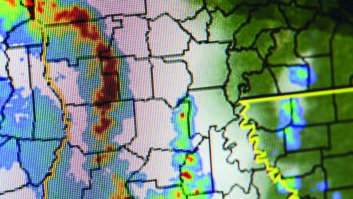“We’ve settled into a routine of bombing and briefings.”
Thus does Anne Garrels begin an entry in “Naked in Baghdad.” The statement is matter-of-fact, like the rest of her new book.
NPR’s senior foreign correspondent was one of 16 non-embedded American journalists who stayed in the Iraq capital as war fell upon it, and the only U.S. broadcast correspondent who remained to cover the initial invasion.
We are blessed with little good writing about radio news and the latent power of the medium. I may be biased — I am a former radio journalist with a wistful bit of would-be war correspondent in me — but her story will interest anyone who wonders how reporters do what they do when bombs are falling.
Recalling Stalin
We see Garrels in pre-war Iraq, working sources despite the presence of minders. We learn what some Iraqis think about Saddam Hussein and the United States. We come to appreciate Amer, her driver, protector and friend.
She reports on the decaying infrastructure even as sparkling new mosques and palaces are built. This is poignant in a city of history and culture, about which an Arab phrase said, “Cairo writes, Beirut publishes and Baghdad reads.”
Garrels files reports for “All Things Considered,” “Morning Edition” and other shows via satellite phone from hotel rooms. Sometimes the work is exciting, at other times it is journalistic ditch-digging. She covers up a mirror so she doesn’t have to see herself “getting grayer” after yet another 1 a.m. report for rush-hour listeners at home.
A Russian speaker, she likens Iraq to the crumbling Soviet Union in the late 1970s. She also compares Iraq’s leader to Stalin, noting that Saddam encouraged children to report their parents for subversive comments.
She becomes adept at bribery and paying “fees” for accreditation. She also has learned in other conflicts that her sex can be a boon. Many women will talk to her about things they would not discuss with a man. However, she must cope with males interested for other reasons. A hotel guard catches her taking a swim in the pool and pulls her aside to “cop a feel.” She laughs him off.
The book reminds us of U.N. inspections, human shields, Saddam videos; the Iraqi information minister and his “stand-up comedy routine”; reports of American pilots in the Tigris, the bombed marketplaces, the inevitable zoo stories. (“Every war has a zoo.”)
We read of Iraqis hungry for news from the BBC, Radio Monte Carlo and VOA; we see the government jamming Radio Sawa. At Internet cafés, Iraqis try to sneak past the government safeguards and Saddam screen-savers to find out what’s happening.
Raw reporting
Garrels knocks her satellite phone to the floor and breaks it; she repairs the panel with tape from a first-aid kit. In the streets she records screaming Iraqis waving body parts of victims, and struggles to determine whether the damage was caused by bombs or anti-aircraft weapons.
We laugh ruefully at the description of her broadcasting naked in her room. She did so in case authorities were to knock on her door; she didn’t want them to confiscate her sat phone and hoped that being in the buff would give her an excuse to keep the door shut long enough to hide the equipment. Robert Siegel apparently had no idea.
Self-effacing, Garrels can’t help but reveal her courage. She remained of her own volition — complaining about the inadequacy of audio gear at recording cannon fire from an A — 10 Warthog; feeling her hotel shudder under fire from a U.S. tank in an incident that killed two colleagues.
An unexpected treasure is a series of e-mails sent to friends by her husband, artist Vint Lawrence. In these he refers to her as Brenda, as in Brenda Starr, the comic strip journalist/heroine.
He is a better writer than she; he is a better writer than I. His beautiful prose, interspersed through the book, illuminates their love story. Vint describes coming home one night to find his “Baghdad Bauble” curled up asleep with a family dog after a 36-hour journey. She calls Vint her “secret weapon,” a source of remarkable stability and support.
This book is a diary in retrospect, a chronicle of what she saw and heard. Her writing is descriptive, not deep, as one expects from a radio reporter.
Discussed too briefly are the choices wartime reporters must make: Should one tactfully avoid forbidden topics, such as Saddam’s personality? Or report everything and risk your visa? Also touched on only briefly are the journalists around her and the personalities to be found among print, TV and radio people.
Occasional gossip about the likes of Geraldo Rivera and Peter Arnett is tantalizing. Recalling an earlier encounter with Rivera, she writes, “It was clear he was playing by different rules that blurred the lines between journalist and combatant. He was upping the ante and I didn’t want to be in his playpen.”
Mixed metaphors aside, I love it. You go, radio girl.
“Our intimate war, with no networks and no stars, has turned into the usual gang-bang,” she says after U.S. troops secure the hotel. “When I see Dan Rather and Christiane Amanpour wandering down my floor, I realize it will soon be time for me to leave.”
We are reminded too that men and women journalists died covering the conflict, including a close friend of Garrels.
Just one view
Understandably the book has no photos; but I miss them. Her text lacks the grit we would expect from a print journalist. Garrels does give us the big flavor, the passing anecdote, the brief meeting with an Iraqi woman in a kitchen or a man at a backgammon table.
I’m intrigued by how reporters do their thing under such circumstances. I appreciate reading about the limitations of what they can achieve. She points out in her introduction that each reporter had but one window on the conflict; hers was from Baghdad.
Indeed her view was only a sliver of a brief war; and the city itself saw relatively little of the fighting. “I am having trouble finding new material that goes beyond official rantings and more ‘thud, thud, thud,'” she laments at one point.
I’m glad she is so frank. Too many reporters are not. Her story is no less compelling.












